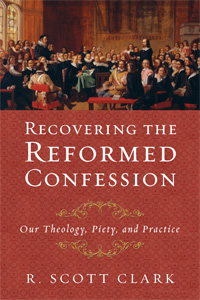Cornelius Jansen (1585-1638) Bishop of Ypres – founder of the Jansenist Movement Continue reading →
Defining “Reformed”
He’s Not Young or Restless, But He is Reformed!
Stephen Ley has an interesting review and comparison between Colin Hanson’s “Restless” and Bob Godfrey’s Unexpected Journey. I’m glad that people are becoming enthused about elements (mainly soteriology) of the Reformed faith. One problem with the “Restless and Reformed” approach is that . . . Continue reading →
The Problem of the Minimalist Definition
Yesterday someone sent a link to an essay posted on a seminary website. In the comments that follow I am not speaking to the seminary per se but I do want to challenge the implied premise of the essay. The fundamental question . . . Continue reading →
Settled and Reformed: How Many Points?
Philip, in the combox at Gene Vieth’s blog, reminded me to re-post the link to a terrific essay by Richard Muller on what defines the adjective “Reformed.”
Young, Restless, and Arbitrary?
I’m watching a video interview of Collin Hansen, author of Young, Restless, and Reformed. At about 21 minutes into the interview I heard a familiar voice: WSC alumnus Jonathan King (MA, HT), now a PhD student at TEDS. You might know JK . . . Continue reading →
Who or What Gets to Define "Reformed" (re-posted)
In response to the post on Bob Godfrey’s Unexpected Journey, Arthur writes to ask, “So does someone who does not hold to every point of doctrine in the Reformed confessions be considered “Reformed”. More to the point, can a credobaptist not be . . . Continue reading →
A Little More on Defining "Reformed"
In response to the “Who or What Gets to Define ‘Reformed’?” post and others like it, some have argued that if the definition of Reformed includes a certain (paedobaptist) view of Baptism then it should also include a certain polity. Some have . . . Continue reading →
Concluding Reflections on RRC
At Restless and Reforming.
Don't Stand There in the Entry, Come on In!
Kevin DeYoung, on of the authors of a terrific book on the emergent/emerging movements has a blog and he writes today about a conference just held at his congregation with Collin Hansen. He makes a couple of points to which I want . . . Continue reading →
Is the Reformed Faith Biblicistic?
Pete Enns thinks so. Or we could define the Reformed faith as that which has been confessed in public, ecclesiastically sanctioned documents which summarize the essentials of the faith. Hmm, someone should write a book making that case!
Calvinism Old and "New"
In response to the recent TIME magazine piece on the YRR, Mark Driscoll published a piece on the Resurgence contrasting the “new” Calvinists with the “old” Calvinists. It was followed up by a piece with a kinder, gentler treatment of the tired, . . . Continue reading →
Video: Is it Possible to Be a "Reformed Charismatic"?
An Australian Anglican minister, Phillip Jensen, says no. Here’s a related earlier post on the same topic.
Post-Thanksgiving Cartoons: Reply to James White
Yes, I’m aware that James White has posted a caricature of my views. Thanks to everyone who wrote to make sure I saw that. Rather than trying to respond to all of his claims, let me focus today on just one to . . . Continue reading →
The Trouble with TULIPS
When the young neo-Evangelicals, Billy Graham, Carl F. H. Henry, & co. established Christianity Today in 1956 they did so to offer an alternative to the more liberal Christian Century magazine. In its early years there was a strong confessionally Reformed presence . . . Continue reading →
Volume 2: Reformed Confessions of the 16th and 17th Centuries
The purpose of the Heidelblog is to help the Reformed churches, Reformed Christians, and those interested in the Reformed faith to “recover the Reformed confession.” Of course, the first and most important resource in doing that is to “read, mark, learn, and . . . Continue reading →
"Informed" or Reformed? A Sub-Text of the PCA Strategic Report?
Of course Reformed Christians want to be well informed but PCA church planter Martin Hedman has been writing some of the most thoughtful and incisive commentaries about the PCA strategic plan. Recently he commented, …it seems more and more that I am . . . Continue reading →
Jeremy is Strangely Attracted to "Recovering" (Updated)
He finds the tone abrasive and high-handed at times, he accuses me of making arguments I don’t recall making (e.g., excluding congregationalists from the definition of Reformed. I’ve been accused of doing that but so far as I recall I didn’t discuss . . . Continue reading →
Was Barth Reformed?
Among the Followers of Karl Barth (d. 1968), both evangelical and mainline (and especially among evangelicals in the mainline) it is sometimes assumed that Barth’s theology was and is the true modern manifestation of Calvin’s theology and to the degree Calvin’s theology . . . Continue reading →
Is There REALLY a "Reformed Resurgence"?
Kevin DeYoung has asked whether the RR will fly in GR. George Barna, however, suggests that, statistically, the RR isn’t flying at all. Indeed, there is no RR. Darryl Hart explains. If it turns out that there was more noise than actual, . . . Continue reading →
Is it Wrong to Be Right? (Updated)
When we moved to the UK in the early 90s one of the several aspects of culture shock that we experienced was the plainness and forthrightness with which people spoke. I don’t know from experience that what we experienced was universal throughout . . . Continue reading →




